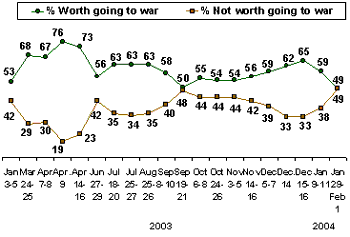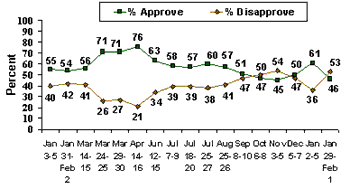GALLUP NEWS SERVICE
PRINCETON, NJ -- A new CNN/USA Today/Gallup poll finds Americans' support for the war in Iraq has retreated from the higher levels coincident with the capture of Saddam Hussein last December, and is essentially back where it was last fall. Today, Americans are evenly divided on whether it was worth going to war at all, and more people disapprove than approve of the way President George W. Bush is handling the situation in Iraq. A month ago, solid majorities said the war was worth it, and approved of Bush's handling of that issue.
The poll, conducted Jan. 29-Feb. 1, finds 49% of Americans saying the war was worth it, and 49% saying it was not.
| Was the Situation in Iraq Worth Going to War Over, or Not? |
 |
The current low rating is virtually the same as that measured by Gallup Sept. 19-21, when Americans said the war was worth it by 50% to 48%. It follows weeks of Democratic criticisms about the handling of the war in Iraq, as well as a recent report by former top U.S. weapons inspector David Kay, saying he found no weapons of mass destruction in Iraq and that U.S. intelligence got it wrong. "It turns out we were all wrong, probably, in my judgment, and that is most disturbing," Kay said.
The low measure last September was taken two weeks after the Bush administration announced that it was requesting $87 billion to help fund the war. In mid-December, after the capture of Hussein, 65% of Americans said it had been worth going to war.
The public's approval of the way Bush is handling the situation in Iraq has also declined in the wake of the Kay report and Democratic criticisms. Just 46% approve, while 53% disapprove, of Bush on this matter, similar to the rating he received last fall. His approval rating jumped after the capture of Hussein, but that rally effect has now disappeared.
| George W. Bush’s Job of Handling
the Situation in Iraq: 2003 – 2004 |
 |
Public Less Certain of Pre-War Iraq Danger
Other measures suggest that Americans have become less certain about the threat posed by Iraq before the war. The percentage who say they are certain each of the following is true, compared with the percentage who said that in a poll last June:
- That Iraq had facilities to create weapons of mass destruction before the war -- 28% are certain now, compared with 44% last June.
- That Iraq was trying to develop nuclear weapons before the war -- 27% certain now vs. 36% last June.
- That Iraq had biological or chemical weapons before the war -- 32% vs. 43%.
- That Iraq had ties to Osama bin Laden's terrorist organization known as al Qaeda before the war -- 31% vs. 40%.
While Americans are less "certain" about each of the above, large majorities (of 70% or more) still believe each of those conditions was at least "likely" to be true. It should be noted that these questions asked about the conditions in Iraq "before the war" and it is possible that some respondents interpreted that as meaning 10 or 15 years before the war, rather than last year.
|
|
|
Likely but not certain |
|
% |
% |
|
|
Iraq had biological or chemical weapons before the war |
32 |
39 |
|
Iraq had ties to Osama bin Laden's terrorist organization known as al Qaeda before the war |
31 |
43 |
|
Iraq had facilities to create weapons of mass destruction before the war |
28 |
43 |
|
Iraq was trying to develop nuclear weapons before the war |
27 |
43 |
A slight majority of Americans still reject the notion that the Bush administration deliberately misled the public on the matter, by a 54% to 43% margin. That is a much smaller gap than was the case when the question was first asked late last spring and people rejected the charge by 67% to 31%.
Do you think the Bush administration deliberately misled the American public about whether Iraq has weapons of mass destruction, or not?
|
Yes, |
|
|
|
|
% |
% |
% |
|
|
2004 Jan 29-Feb 1 |
43 |
54 |
3 |
|
2003 Jul 18-20 |
39 |
58 |
3 |
|
2003 Jun 27-29 |
37 |
61 |
2 |
|
2003 Jun 9-10 |
31 |
64 |
5 |
|
2003 May 30-Jun 1 |
31 |
67 |
2 |
Despite Kay's charge of intelligence failure, three-quarters of Americans say they have either a "great deal" (23%) or "moderate amount" (52%) of confidence in the U.S. intelligence system. In his testimony before Congress, Kay said the intelligence information was not distorted in any way, but that it was simply flawed.
How much confidence do you have in the U.S. intelligence system to determine the threats other nations pose to the United States -- a great deal, a moderate amount, not much, or none at all?
|
Great |
Moderate |
Not |
None |
No |
|
|
2004 Jan 29-Feb 1 |
23% |
52 |
19 |
4 |
2 |
Still, the following table illustrates the importance of finding weapons of mass destruction to public support for the war. Slightly less than half, 48%, of Americans say the war with Iraq is justified even if no weapons are found, but 23% say their view of the war's justification is directly dependent on the issue of whether or not weapons are found. Another 25% say the war is not justified in any circumstance.
Which comes closer to your view about the U.S. war with Iraq -- [ROTATED: it is justified even if no weapons of mass destruction are found in Iraq, it is justified only if weapons of mass destruction are found, or it is not justified even if weapons of mass destruction are found in Iraq]?
|
|
|
Not |
|
|
|
2004 Jan 29-Feb 1 |
48% |
23 |
25 |
4 |
Survey Methods
Results are based on telephone interviews with 1,001 national adults, aged 18 and older, conducted Jan. 29-Feb. 1, 2004. For results based on the total sample of national adults, one can say with 95% confidence that the margin of sampling error is ±3 percentage points.
In addition to sampling error, question wording and practical difficulties in conducting surveys can introduce error or bias into the findings of public opinion polls.
